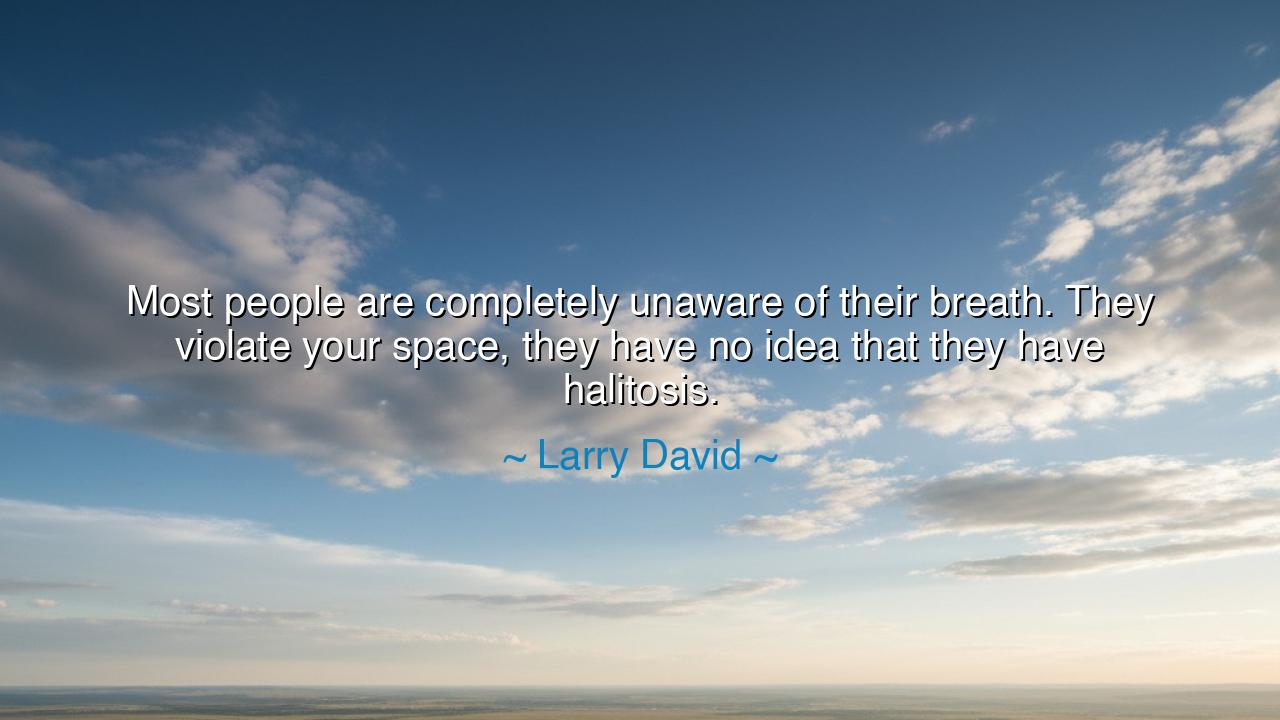
Most people are completely unaware of their breath. They violate
Most people are completely unaware of their breath. They violate your space, they have no idea that they have halitosis.






"Most people are completely unaware of their breath. They violate your space, they have no idea that they have halitosis." With these words, Larry David casts a sharp light on the unnoticed, yet deeply significant, aspects of our existence—the small habits and personal boundaries that we often overlook in our daily lives. In his witty, no-nonsense manner, David reminds us of a profound truth: while we may be highly aware of the larger external forces shaping our world, we often neglect the small, intimate actions that affect those around us. Our breath, something so vital and yet taken for granted, becomes an apt symbol for the things that we fail to notice—those imperceptible actions that invade the space of others and go unnoticed in our own consciousness.
In the ancient world, the great philosophers often emphasized the importance of self-awareness—not just in grand matters of morality and philosophy, but in the small, everyday actions that define who we are. Socrates, for example, famously said, "Know thyself"—a command to examine not just one’s thoughts, but the nuances of daily life, the gestures, and habits that reveal much about a person’s true character. To be truly wise, Socrates believed, one must be aware of the smallest details of life, for it is in these details that our true nature is revealed. David’s quote mirrors this ancient wisdom by pointing out how, often, the most important things—the things that affect our relationships and our environments—go unnoticed simply because we lack awareness.
Consider the way the Greeks understood the concept of harmony. Pythagoras, for instance, believed that the whole universe was bound by certain harmonious ratios, and that the human soul could achieve peace through balance. In this framework, even the smallest actions—like the way we breathe or the space we take up—have profound consequences. If one’s actions are out of sync with the world around them, they disrupt the natural flow of harmony. David’s reflection on halitosis (bad breath) is a modern example of this principle: a small oversight—a lack of attention to our own presence and its impact on others—can disturb the harmony we seek to maintain in our relationships.
In history, there are countless examples of individuals whose lack of self-awareness led them to violate the personal space of others, either unintentionally or ignorantly. One such example is King Louis XIV of France, the infamous "Sun King," whose arrogance and sense of entitlement led him to disregard the boundaries of others. He lived in a world where his personal space was often dictated by the whims of his court, yet he failed to see how his behavior—his constant indulgence, his lack of empathy for those around him—caused unrest among his subjects. Despite his towering influence, Louis XIV’s lack of self-awareness about the small things in life, such as the discomfort he imposed on others, ultimately contributed to the decay of his court and the instability of his kingdom.
Contrast this with the life of Mahatma Gandhi, who was known for his self-discipline and deep awareness of even the smallest details of his behavior. Gandhi’s ability to live with such purpose and humility was rooted in his constant practice of examining his own actions. He was keenly aware of how his words, his breath, his presence, affected those around him. Gandhi’s deep understanding of the self allowed him to lead with integrity, to resist the temptation to impose his will upon others. His example teaches us that true power comes not from the force of our actions but from the awareness of how we move through the world—how we occupy space and how we make others feel.
The message Larry David imparts to us is simple yet profound: in order to live harmoniously with others, we must develop awareness of our smallest actions and habits. Whether it is our breath, our tone of voice, or the space we take up, every action has the potential to either enhance or diminish the relationships we have. The lesson here is one of presence—to be truly present with others, we must be fully aware of our impact on them, especially in the subtle, everyday moments. Self-awareness is not only about our intentions but also about how our actions affect others, whether we intend them to or not.
In practical terms, this means cultivating a habit of mindfulness—not only in our thoughts but in our physical presence. Pay attention to the space you occupy, the way you move through the world, and the subtle ways your actions affect others. Are you aware of how your words and body language make others feel? Are you conscious of your personal habits, like your breath, and how they might be perceived? The next time you find yourself in a crowded room or speaking to someone, pause for a moment and consider: How am I presenting myself? How is my energy affecting those around me? By cultivating this awareness, we can move through the world with greater sensitivity and consideration, fostering relationships that are grounded in mutual respect.
Ultimately, Larry David is calling us to wake up to the small things, to the things that seem trivial but are actually the foundation of how we relate to others. We must be mindful of our presence, for in doing so, we cultivate an environment of respect and harmonious interaction. In the words of the ancients, this awareness is the path to wisdom, for true wisdom is not found in grand ideas alone, but in the smallest and most humble actions that shape the lives of those around us.






AAdministratorAdministrator
Welcome, honored guests. Please leave a comment, we will respond soon